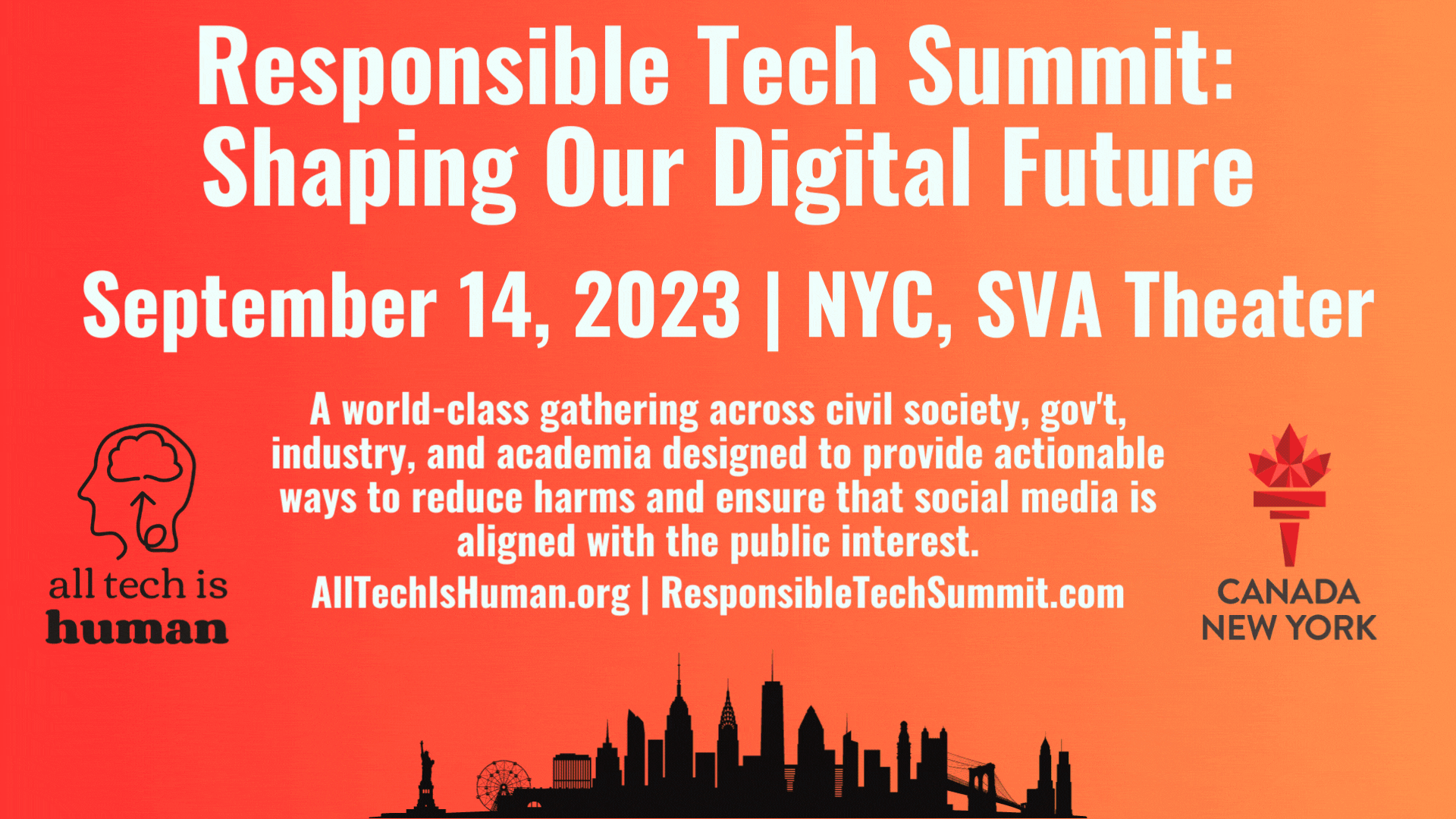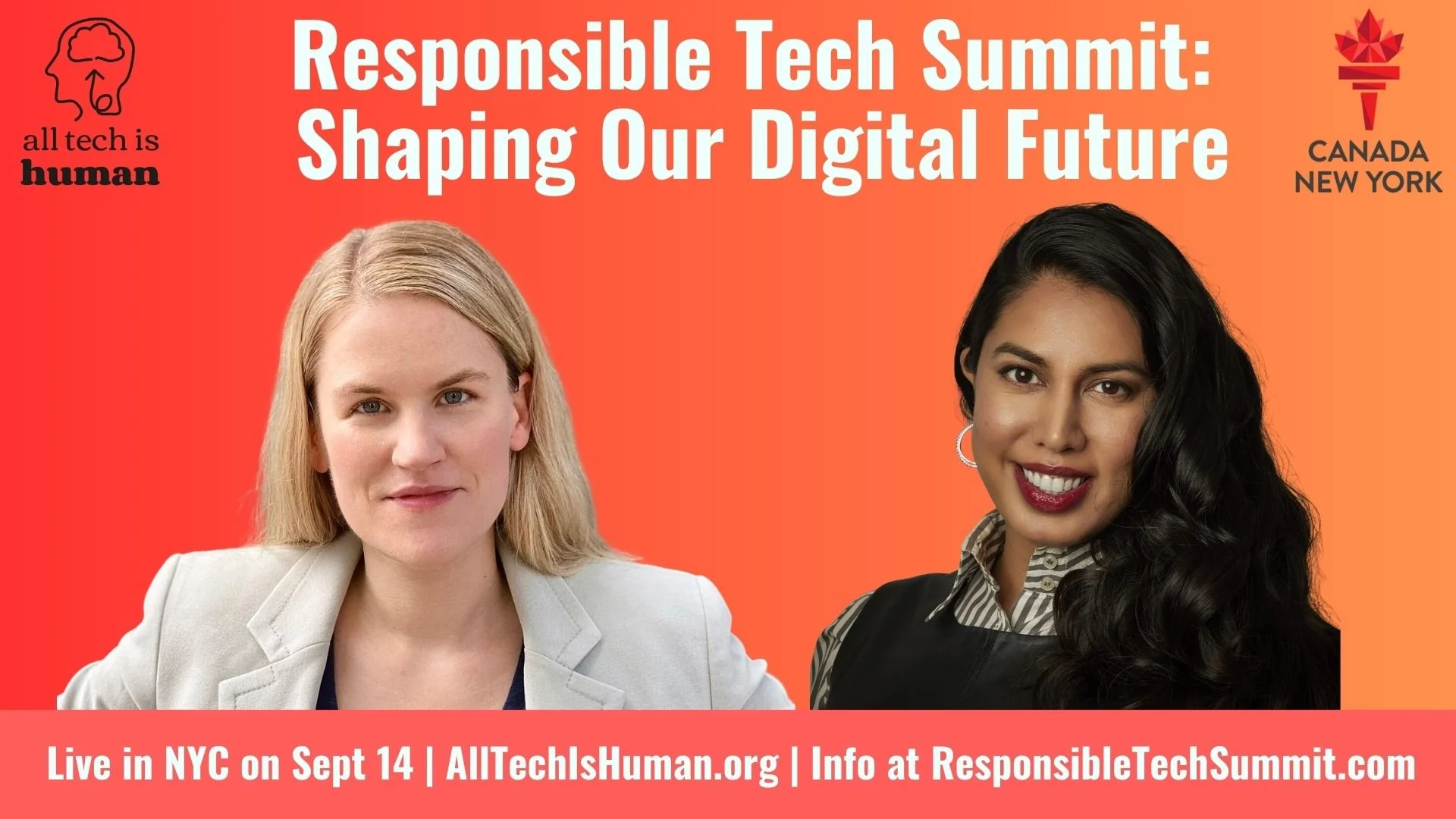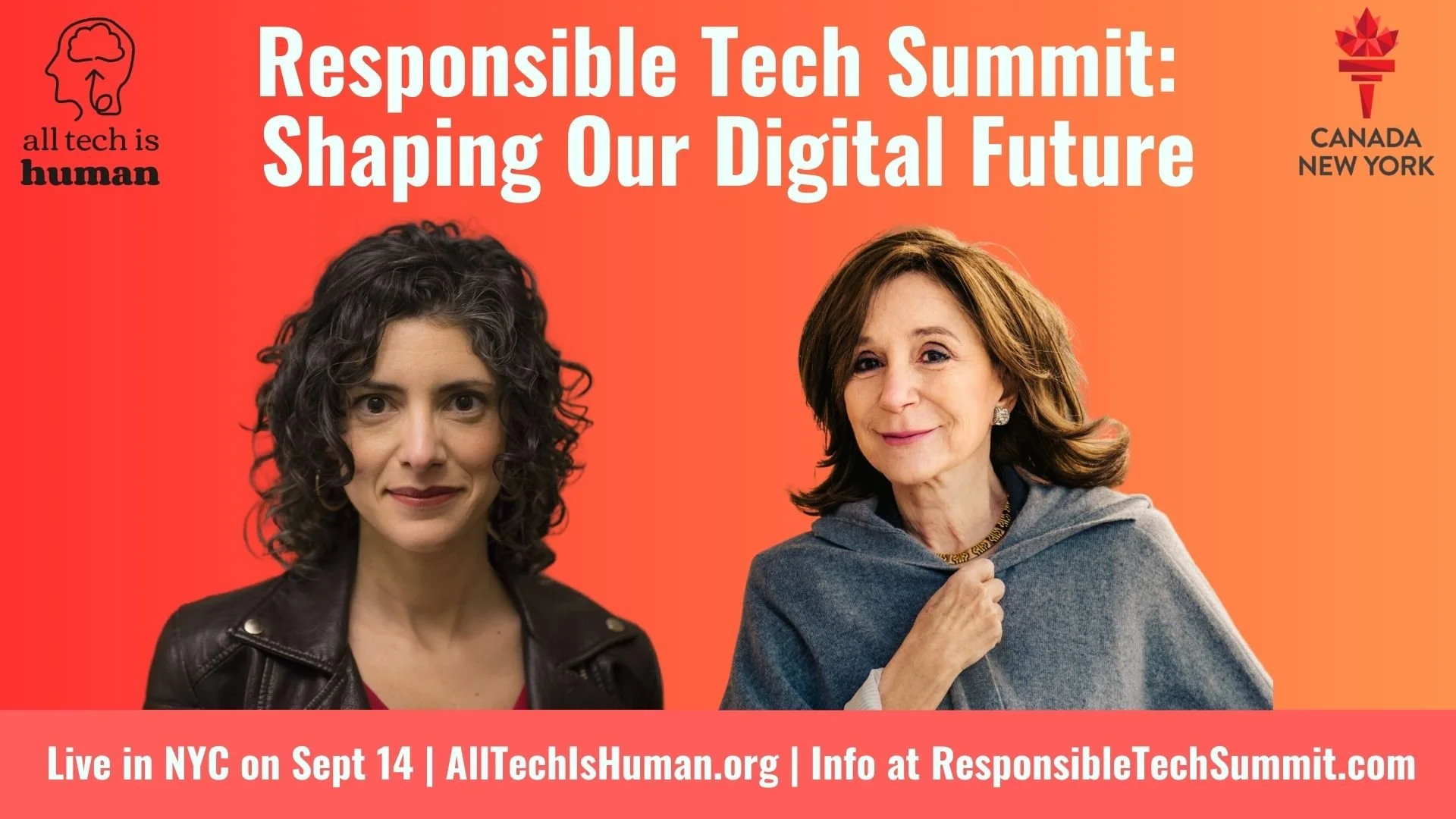Responsible Tech Summit: Shaping Our Digital Future - September 14, 2024, SVA Theatre 🍁
📅 Thursday, September 14th
🕒 3:00 PM - 7:00 PM
📍SVA Theater - 333 W. 23rd New York, NY, 10011
The Responsible Tech Summit: Shaping Our Digital Future will feature two panels, two fireside chats, and ample time to share resources and learn from one another. Special pre-and-post Summit networking and mixing events will soon be announced.
Event Description:
275 individuals across civil society, government, industry, and academia will come together in NYC to tackle wicked tech & society issues. The upcoming summit is focused around uniting stakeholders, promoting knowledge-sharing & collaboration, and understanding values and trade-offs to co-create a tech future aligned with the public interest. This gathering will coincide with the upcoming release of All Tech Is Human’s Responsible Tech Guide and is being done in partnership with the Consulate General of Canada in New York.
There is no charge to attend the Responsible Tech Summit. Because of limited capacity, we utilize this INTEREST FORM and then send out invitations. We aim to curate a good mix of backgrounds across civil society, government, industry, and academia.
All Tech Is Human Read about our mission here and view all of our projects here.
PANELS | FIRESIDE CHATS | MIXER | KNOWLEDGE-SHARING
AGENDA
2:30 to 3:00pm | Arrival and networking
3:00 to 3:15pm | Opening remarks
3:15 to 3:45pm | Fireside chat w/ Sherry Turkle and Julie Scelfo
3:45 to 4:30pm | How AI Will Transform Elections PANEL
4:30 to 4:45pm | Networking
4:45 to 5:15pm | Fireside chat w/ Tim Wu and Justin Hendrix
5:15 to 6:00pm | Fireside chat w/ Frances Haugen and Nabiha Syed
6:00 to 6:15pm | Networking
6:15 to 6:45pm | Digital Spaces and Public Goods PANEL
6:45 to 7:00pm | Wrap-up and takeaway
7:00pm on: Mixer + networking
Session #1 - Panel: “How AI Will Transform Elections”
The stakes for global democracy are high in 2024, as major elections are scheduled in India, South Africa, South Korea, Ukraine, the U.S., and more. Recent advancements in AI technology have the potential to transform the electoral landscape, with experts warning that generative AI and deepfakes may be powerful tools to spread misinformation on social media. How are policymakers and the private sector responding to put safeguards in place ahead of elections? How can civil society groups help monitor threats and counter misinformation? Are there emerging AI tools that can help strengthen democratic debate and boost voter confidence?
Samantha Bradshaw, Fellow, Center for International Governance Innovation
Samantha Bradshaw is a CIGI fellow and a leading expert on technology and democracy. Her research concerns the politics embedded in information and communication technologies, and how political actors exploit these affordances for propaganda and persuasion.Samantha completed her Ph.D. at the Oxford Internet Institute and is a post-doctoral fellow at Stanford University, where she contributes to the work of the Internet Observatory and the Digital Civil Society Lab. Her research and writing on foreign influence operations, disinformation and platform governance have been published in leading academic journals, including New Media & Society, Policy & Internet, Internet Policy Review and the Columbia Journal of International Affairs. Her work and public writing have also been featured by numerous media outlets, including The New York Times, The Washington Post, The Globe and Mail, the Financial Times, CNN and Bloomberg News. Samantha has spoken on expert panels and delivered keynote lectures around the world, including to the United Nations Educational, Scientific and Cultural Organization and the North Atlantic Treaty Organization. She has also been involved in public policy discussions in the United Kingdom, Canada and the United States, briefing officials and providing expert-witness testimony to several ongoing political processes about the effects of technology on democracy.
Allie Funk, Research Director for Technology and Democracy, Freedom House.
As Research Director for Technology and Democracy, Allie serves as an expert on human rights in the digital age. She leads Freedom House's technology and democracy initiative, including Freedom on the Net, Election Watch for the Digital Age, and work related to protecting a free and open internet. She also represents Freedom House on the Freedom Online Coalition's Advisory Network, and serves on the Global Network Initiative's Board of Directors. Her writing has been published in the Washington Post, the Los Angeles Times, WIRED, Lawfare, the Hill, the Diplomat, and Just Security, among others.
Prior to joining Freedom House, Allie worked at the National Association of Criminal Defense Lawyers on issues relating to U.S. surveillance, closing the Guantanamo Bay detention facility, and the right to counsel, and also worked with Human Rights First’s foreign policy team. She holds a master's degree in human rights from the London School of Economics and Political Science and a B.A. in philosophy and political science from the University of Louisville.
Shuman Ghosemajumder is a Canadian technologist, entrepreneur, and author. He is the former click fraud czar at Google, the author of works on technology and business including the Open Music Model, and co-founder of TeachAids. He was chief technology officer for Shape Security, which was acquired in 2020 for $1 billion by F5 Inc where he became head of artificial intelligence.
Heather Evans, Schwarzman Scholar and AI Expert
Heather Evans has worked in AI for 8 years in roles spanning government policy, applied AI product development and launching new ventures. Heather worked as a senior adviser in artificial intelligence for the Ontario Government where she helped establish the Vector Institute through the Pan-Canadian AI Strategy. She launched a tech diplomacy program through the Asia Society focused on AI regulations across the US, EU, and China. Heather’s second startup venture focused on NLP and its failure was a fantastic lesson in bringing AI to market. Evans earned a bachelor's degree in commerce from Queen's University, and a master's degree in global affairs from Tsinghua University in China. She has been recognized as “one to watch” from Queens university and received the “Amethyst Award” in recognition of her contribution to the Ontario Public Service.
Session #2 - Fireside Chat with Frances Haugen and Nabiha Syed
Frances Haugen is an advocate for accountability & transparency in social media. Born in Iowa City, Iowa, Frances is the daughter of two professors and grew up attending the Iowa caucuses with her parents, instilling a strong sense of pride in democracy and responsibility for civic participation.
Frances holds a degree in Electrical and Computer Engineering from Olin College and a MBA from Harvard University. She is a specialist in algorithmic product management, having worked on ranking algorithms at Google, Pinterest, Yelp and Facebook. In 2019, she was recruited to Facebook to be the lead Product Manager on the Civic Misinformation team, which dealt with issues related to democracy and misinformation, and later also worked on counter-espionage.
Nabiha Syed is the chief executive officer of The Markup. She oversees The Markup’s strategy, growth plans and business operations. Nabiha also oversees legal, communications, personnel and other operational matters.
Before joining The Markup, Nabiha was vice president and associate general counsel at BuzzFeed, where she counseled on newsgathering, libel, and privacy matters worldwide. Under her leadership, the company successfully defended against libel litigation arising out of the publication of the Steele dossier and initiated numerous notable access litigations. Prior to BuzzFeed, Syed co-founded the nation’s first media access law clinic, currently in its 10th year of operation at Yale Law School, and served as a First Amendment Fellow at The New York Times.
Session #3 - Fireside Chat with Sherry Turkle and Julie Scelfo
Sherry Turkle is the Abby Rockefeller Mauzé Professor of the Social Studies of Science and Technology in the Program in Science, Technology, and Society at MIT, and the founding director of the MIT Initiative on Technology and Self. Her previous books include the New York Times bestseller Reclaiming Conversation: The Power of Talk in a Digital Age, Alone Together: Why We Expect More from Technology and Less from Each Other; The Second Self: Computers and the Human Spirit; Life on the Screen: Identity in the Age of the Internet; and Simulation and Its Discontents. Her newest book, The Empathy Diaries: A Memoir, ties together her personal story with her groundbreaking research on technology, empathy, and ethics.
Julie Scelfo is an award-winning journalist and Founder & Executive Director of Get Media Savvy, a nonprofit working to establish a healthy media environment for kids and families. The organization is catalyzing a nationwide embrace of 21st-century media literacy survival skills using an array of pop culture strategies. She is also a parent of three who believes in prioritizing people over technology.
Session #4 - Panel: “Digital Spaces & Public Goods”
We have come to rely on the Internet to provide access to government services, educational materials and resources, serve as an advocacy tool, build coalitions, and provide public goods. As a result, the internet and digital spaces have come to influence civic life and civic engagement in evolving ways. Moreover, digital civic engagement is rapidly evolving with the general public gaining more access to emerging technologies, such as generative artificial intelligence. Yet the transparency and accountability mechanisms of many of the tech platforms that facilitate these engagements are limited. This panel will explore how to create and expand healthy digital spaces, give examples of current existing healthy spaces, best practices, and what future spaces might look like from a global lens. Consideration will be given to how to create digital spaces that work for all current and future users, especially those from the global majority, and how to foster digital inclusion, diversity, and innovation.
Sinead Bovell
A first generation Canadian, Sinead Bovell was born to an Irish mother and a Guyanese father in a city outside of Toronto. She spent the majority of her young adult life focused on academics, receiving a degree in finance, a minor in chemistry, and a Masters in Business from the University of Toronto, before moving on to a career in management consulting. However, Sinead decided to leave the corporate world in order to make an impact on a larger scale. Watch Sinead’s two minute career story video here.
In January 2021, Sinead was appointed to the United Nations International Telecommunications Union Generation Connect Visionaries Board to further champion the voices of youth to advance digital development and offer strategic guidance on youth participation and empowerment in digital cooperation.
Sinead is also a member of the IEEE Global Initiative Education Committee and the Tech and Concentration of Power committee.
Sabhanaz Rashid Diya, Co-Founder, Tech Global Institute.
Sabhanaz Rashid Diya is the founding member at Tech Global Institute, a global policy lab with a mission to reduce equity and accountability gaps between technology platforms and the majority world. She is trained as a computational social scientist with over 17 years of experience at the intersection of technology policy, ethics and global development. She was previously the Head of Public Policy for Bangladesh at Meta, where she engaged policymakers and led on various regulatory and legislative issues, including hate speech, privacy, data protection and the data economy, online harms and algorithmic transparency. Diya also worked at the Bill & Melinda Gates Foundation, leading policy and advocacy efforts in multidisciplinary digital economy, data and artificial intelligence. Her career spans across private and public sector in the U.S., Asia and Africa, including USAID and the World Bank, on fintech, national security, digital trade and Internet governance. She is the founding Board Director for U.S. Bangladesh Business Council at the U.S. Chamber of Commerce. She holds a Master's degree in public policy and data science from the University of California, Berkeley, and is a Asia 21 Leader at the Asia Society and a Term Member at Council on Foreign Relations.
Sinead Bovell, Generation Connect Visionaries Board Member, International Telecommunication Union
A first generation Canadian, Sinead Bovell was born to an Irish mother and a Guyanese father in a city outside of Toronto. She spent the majority of her young adult life focused on academics, receiving a degree in finance, a minor in chemistry, and a Masters in Business from the University of Toronto, before moving on to a career in management consulting. However, Sinead decided to leave the corporate world in order to make an impact on a larger scale. Watch Sinead’s two minute career story video here.Camille Carlton, Senior Policy Manager, Center for Humane TechnologyCamille is the Senior Policy Manager at Center for Humane Technology. She previously worked on technology research at UC Berkeley, where she examined issues of power, governance, and shared prosperity. She is an Aspen Tech Policy Scholar, holds a master’s degree in economic development from the London School of Economics and Political Science, and has been published in Science.
Theodora Skeadas is a Public Policy Strategic Advisor and advances Responsible Technology Development. This year, she has also been consulting with Carnegie Endowment for International Peace's Partnership for Countering Influence Operations on government efforts to combat disinformation in Ukraine, National Democratic Institute on online gender-based violence and women’s political participation, and the Committee to Protect Journalists on a journalist safety tool, and she works part-time as the Executive Director of Cambridge Local First, a community nonprofit that addresses economic development issues.
Previously at Twitter, she managed the Trust and Safety Council, a research hub within the Public Policy team, and a trusted flaggers program for human rights defenders, and she supported the Twitter Moderation Research Consortium. Before that, she spent five years working in national security at Booz Allen Hamilton, examining public sentiment, social movements, and disinformation using social media for the U.S. Federal Government. Previously, she worked with nonprofits in Morocco (Search for Common Ground, Innovations for Poverty Action, Sidi Moumen Cultural Center, and Sister Cities International - Africa), Turkey (Fulbright), Palestine (Inspire Dreams), Greece (Center for Hellenic Studies), and Costa Rica (World Teach).
Camille Carlton, Senior Policy Manager, Center for Humane Technology
Camille is the Senior Policy Manager at Center for Humane Technology. She previously worked on technology research at UC Berkeley, where she examined issues of power, governance, and shared prosperity. She is an Aspen Tech Policy Scholar, holds a master’s degree in economic development from the London School of Economics and Political Science, and has been published in Science.






